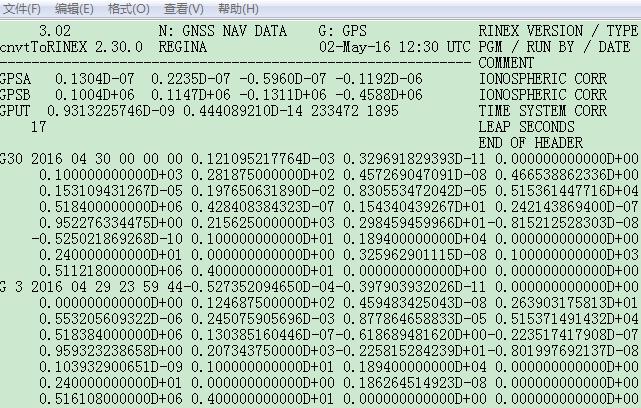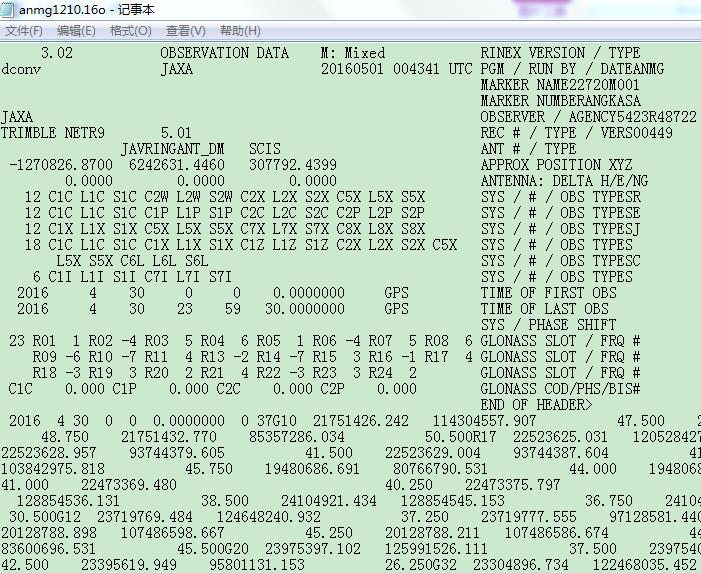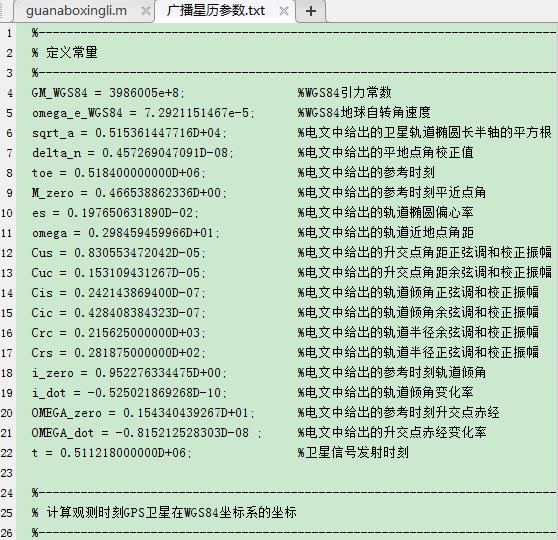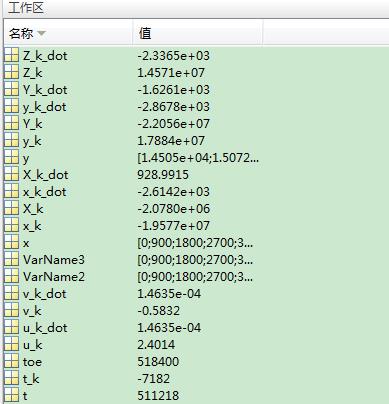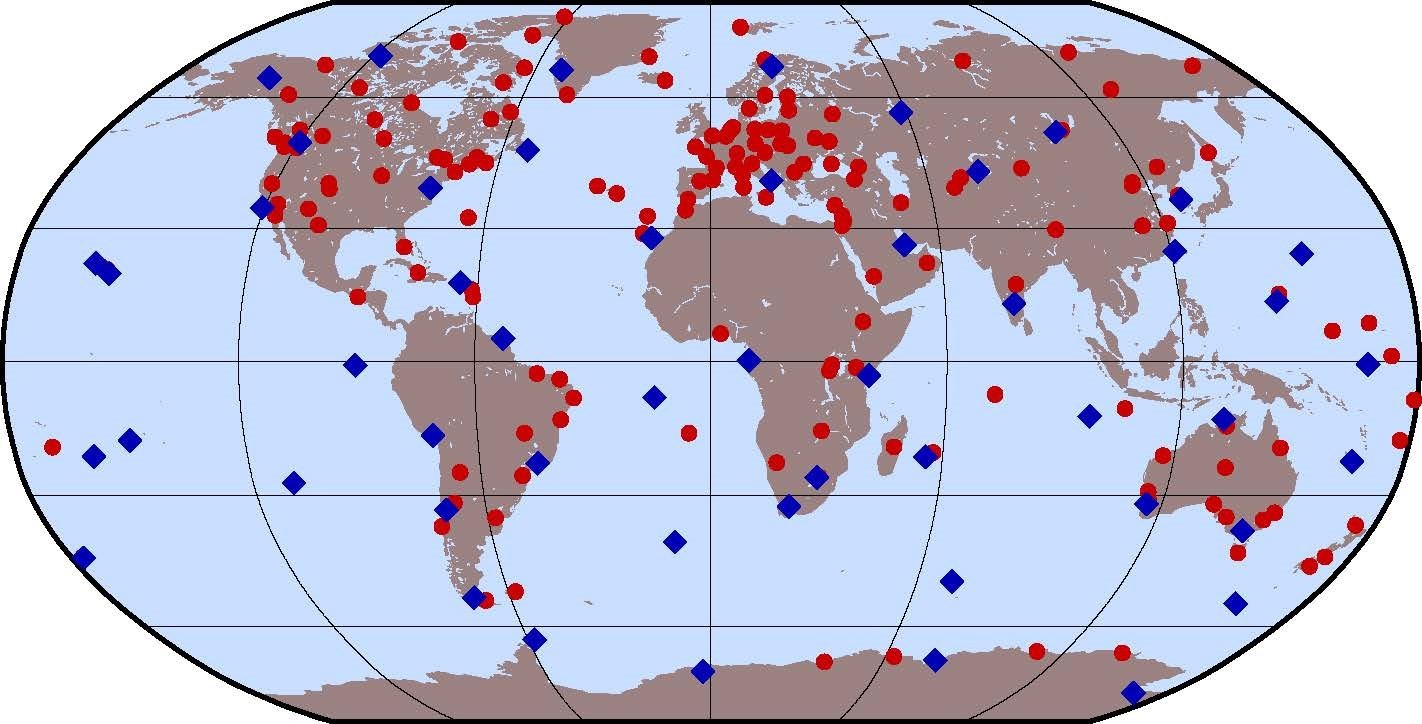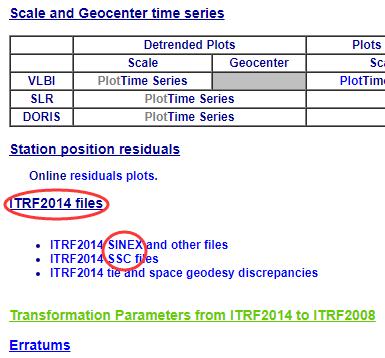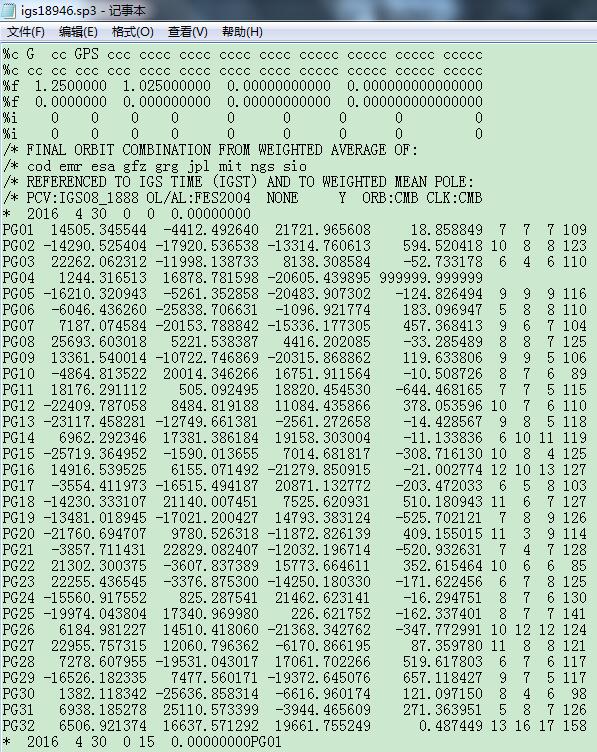卫星坐标的计算和内插毕业论文
2020-04-15 20:29:26
摘 要
首先描述了GPS卫星运动的相关信息,运动的轨道信息和广播星历、处理后的精密星历,获取得到所需的文件,并对文件数据进行说明,再利用广播星历对卫星位置进行求解,对发布的精密星历通过MATLAB编程来实现坐标的内插和计算,最后对计算结果进行精度分析,GPS定位的过程中需要将空间坐标发送给用户,这一过程的实现需要大量的基础数据,所以对两种星历文件的解读具有相当重要的作用。
广播星历和精密星历的获取和下载;广播星历数据的解读过程,以n文件和o文件为主,依据广播星历历元参数计算坐标,注意各参数的表示;精密星历解码的过程,通过对精密星历内插拟合方法的理解以及与IGS最终产品结果进行详细对比分析与精度评估。结果表明该方法对实时卫星坐标定位精度有着显著提高;精密星历内插,可以实现任意时刻卫星坐标的计算,通过已知值选择不同阶数的拉格朗日插值公式内插得到坐标,最后经过误差比较,选取合理的计算方法。两次使用编程过程中,避免大量的赋值计算步骤,实现过程中对编程语言提炼的要求比较高,需要采用更为简洁的可执行性程序语言,多次改变思路,以减少繁琐的赋值过程。
关键词:广播星历 精密星历 星历参数 精密星历内插。
Satellite coordinate calculation and interpolation
Abstract
Firstly, the related information of GPS satellite motion, the orbit information of the motion and the broadcast ephemeris, the processed precise ephemeris, the required files are obtained, decoded successively, and the satellite position is solved by the broadcast ephemeris, and IGS. Accurate interpolation and calculation of the published precision ephemeris by MATLAB programming. Finally, the accuracy of the calculation result is analyzed. In the process of GPS positioning, the space coordinates need to be sent to the user. The implementation of this process requires a large amount of basic data, so The interpretation of the two ephemeris files plays a very important role.Acquisition and download of broadcast ephemeris and precise ephemeris;Acquisition and download of broadcast ephemeris and precise ephemeris.The decoding process of the broadcast ephemeris data is mainly based on the n file and the o file, and the coordinates are calculated according to the parameters of the broadcast ephemeris epoch, and attention is paid to the representation of each parameter.The process of precise ephemeris decoding, through the understanding of the precision ephemeris interpolation method and the detailed comparison analysis and accuracy evaluation with the IGS final product results. The results show that the method has a significant improvement on the accuracy of real-time satellite coordinate positioning. Precise ephemeris interpolation can realize the calculation of satellite coordinates at any time. The coordinates are obtained by interpolating the Lagrange interpolation formula with different orders by known values. In the process of using the programming twice, a large number of assignment calculation steps are avoided, and the requirements for refining the programming language are relatively high during the implementation process.It is necessary to adopt a more concise executable programming language and change the ideas many times to reduce the cumbersome assignment process.
Key words: broadcast ephemeris; precise ephemeris; ephemeris parameters; precision ephemeris interpolation.
目录
摘 要 I
Abstract II
第一章 绪论(GPS) 1
1.1引言 1
1.2 卫星坐标计算研究现状 1
1.3 研究目的与意义 4
1.4 研究内容 4
第二章 广播星历算法研究 5
2.1 依据广播星历计算的原理与意义 5
2.1.1依据广播星历计算原理及意义 5
2.1.2广播星历RINEX文件格式 5
2.1.3广播星历确定坐标的意义 7
2.2卫星坐标数据处理与算法实现 7
2.2.1卫星位置的计算 7
2.2.2广播星历的解说及计算 11
2.3本章小结 14
第三章 精密星历插值算法研究 15
3.1精密星历计算的原理与意义 15
3.1.1三角高程 15
3.1.2 IGS服务 16
3.1.3 精密星历sp3格式 17
1. sp3格式数据 17
2. sp3格式说明 18
3.2 精密星历插值计算过程 19
3.2.1拉格朗日插值法 19
3.2.2 牛顿插值法 20
3.3实例分析 21
3.3.1 插值法的MATLAB实现 21
3.4本章小结 22
第四章 结论与展望 23
4.1主要工作与结论 23
4.2展望 23
参考文献 24
附录 26
致谢 27
第一章 绪 论(GPS)
1.1 引 言
GPS是美国国防部于20世纪70年代开始设计、建设和研制的 ,最初只用于军事,后来引为民用,经过多年的控制和维护,耗费了大量的资金于1993年全面自助研制而成 ,其中第一颗卫星发射于1978年,直到完成时才形成了整个完整的GPS运转系统,该运转系统具有获取一定范围内的三维坐标能力。
在基本的功能构建完成之后,形成了GPS的三大主要系统。这些卫星平均分布在6 个不同的轨道面上,每颗卫星的使用频率又不尽相同,按照差异又形成了不同的定位服务;这些卫星也受到监测站的控制,由铯钟和接收机来监控,并获取得到精密星历和卫星时钟,为反馈得到接收机信号做基础准备,最初GPS工作的卫星频率比较单一,最主要为卫星导航提供信号,后来又增加了L5载波频率,一起组成了伪随机噪声码[6][7][8][9] 。随着系统现代化计划的开展,GPS 也进入了新时期,从最初的发射改进型Block II R-M卫星新增L1和L2码,同时决定增设一个L5 第三民用频率,将其附加在 Block IIF 卫星中,其频率为 1176.45MHz,相应的波长为 25.48cm。商用和民用大量使用需求的增加使得GPS不断的升级、更新,在原有基础之上,增加多个导航信号,其中就有GPS系列卫星的连续捕捉,对卫星运行的健康状况监测也进行了更好的完善;性能方面,采用先进的材料制作成的原子钟也提高了精度,计划今后共计36颗Block卫星,以取代 Block II代系列卫星,更加全面的实现定位和授时服务。用户接收机可以用于GPS 用户对卫星高度角的迅速跟踪和连续卫星的捕获,从而利用这些信息测出它们之间的时间与距离,进而计算得到所求测站和用户之间的三维坐标与钟差等相关信息。 [10][11][12] 。
以上是毕业论文大纲或资料介绍,该课题完整毕业论文、开题报告、任务书、程序设计、图纸设计等资料请添加微信获取,微信号:bysjorg。
相关图片展示:
